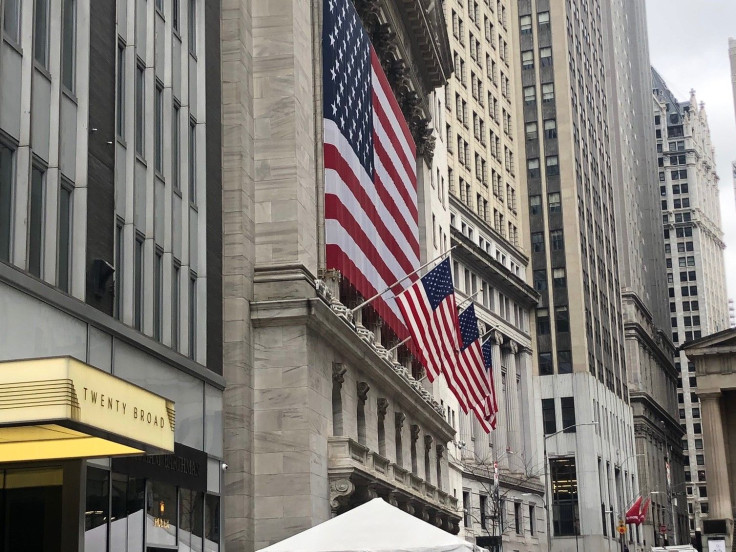Thursday’s Stock Market Close: US Equities Slip As Traders Weigh Grim Economic Data, China-Hong Kong Tensions

KEY POINTS
- About 2.1 million Americans filed claims for unemployment last week
- Continuing claims fell for the first time during the pandemic to 21.1 million
- Orders for durable goods plunged by 17.2% in April
U.S. stocks fell on Thursday, erasing earlier gains, as traders mulled some grim economic data while watching worrisome developments in Hong Kong.
The Dow Jones Industrial Average dropped 147.63 points to 25,400.64, while the S&P 500 fell 6.4 points to 3,029.73 and the Nasdaq Composite Index tumbled 43.37 points to 9,368.99.
Thursday’s volume on the New York Stock Exchange totaled 4.6 billion shares with 1,185 issues advancing, 36 setting new highs, and 1,785 declining, with one setting a new low .
Active movers were led by General Electric Co. (GE), ARCA Biopharma Inc. (ABIO) and Bank of America Corp. (BAC).
About 2.1 million Americans filed claims for unemployment last week, the lowest weekly amount since the coronavirus pandemic commenced. Since mid-March, more than 40 million people have filed such claims.
Robert Gibbs, former White House Press Secretary, tweeted: “Some good news though: Continuing claims fell for the first time during the pandemic to 21.1 million, meaning some are being hired [and] going back to work.”
The National Association of Realtors said on Thursday that the index of pending home sales plunged by 21.8% in April from March.
Orders for durable goods plunged by 17.2% in April. Core durable orders fell 5.8%.
Revised government data showed the U.S. economy shrank at an annualized 5% rate in the first quarter instead of 4.8%.
But some observers think the economy has bottomed out.
Bank of America (BAC) CEO Brian Moynihan told CNBC that the U.S. economy is coming “out of the hole,” adding: “You’re seeing us come out of the depths of where we were in April, and that’s good news.”
New York Federal Reserve Bank President John Williams said on Thursday that the central bank has much more room to provide stimulus to boost the economy.
“I don’t think we’re anywhere near the limit to that,” Williams said. “The U.S. government is issuing a lot of debt right now, and global investors are gobbling it up.”
Gregory Faranello, head of U.S. rates trading at AmeriVet Securities, wrote: “The greatest stimulus for the economy is a safe reopening. In the end, reopening in and of itself will gradually show improvement although the true demand side still remains unclear.”
However, U.S.-China tensions keep escalating.
China’s National People’s Congress approved a bill imposing a new national security law that will bypass Hong Kong’s own legislature. On Wednesday, U.S. Secretary of State Mike Pompeo said Hong Kong was no longer autonomous, jeopardizing its special trade status.
Overnight in Asia, markets finished mixed. The Shanghai Composite edged up 0.33%; Hong Kong’s Hang Seng slipped 0.72%; while Japan’s Nikkei-225 rose 2.32%.
In Europe markets finished higher, as Britain’s FTSE-100 gained 1.21%, while France’s CAC-40 climbed 1.76% and Germany’s DAX rose 1.06%.
Crude oil futures rose 1.89% at $33.43 per barrel, Brent crude slipped 0.61% at $35.81. Gold futures edged up 0.27%.
The euro gained 0.59% at $1.074 while the pound sterling rose 0.49% at $1.2318.
The yield on the 10-year Treasury jumped 3.68% to 0.705% while yield on the 30-year Treasury gained 2.79% to 1.474%.
© Copyright IBTimes 2025. All rights reserved.





















